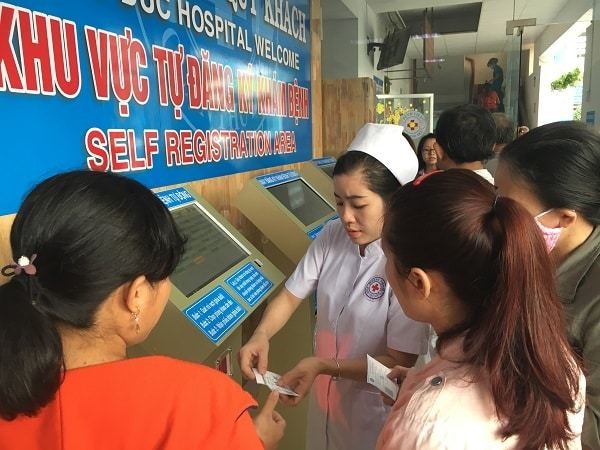 Society
Society

A smart healthcare system that exploits Big Data and artificial intelligence (AI) has been set up by the Ministry of Health to improve the quality of health examinations and medical treatment.
 |
| IT is being used at Thủ Đức District Hospital in HCM City for patient registrations. — Photo benhvienthuduc.vn |
HCM CITY — A smart healthcare system that exploits Big Data and artificial intelligence (AI) has been set up by the Ministry of Health to improve the quality of health examinations and medical treatment.
Each locality in the country is expected to develop a smart healthcare system based on their own conditions, according to the ministry.
The ministry has issued a set of criteria for IT applications toward smart health, according to Trần Quý Tường, head of Electronic Health Administration of Việt Nam.
Under the criteria, a hospital will be considered “smart” if it uses artificial intelligence and has software to manage information, tests, storage and image transmission, electronic health records and kiosks for patients to search for information.
HCM City’s City Department of Health has instructed hospitals to draw up a road map that will include human resources and capital expenditures for their facilities.
They have also been required to develop and contribute to a shared database for the city’s health sector.
The department plans to develop comprehensive IT applications in administration, health and treatment at all health facilities in the city.
Patients’ health records will be digitalised under the smart healthcare system.
This will allow patients to more easily find and choose the right specialists for their medical care as well as make medical appointments.
The results of patients’ tests will be stored in the database, which, for now, is only accessible to doctors. But in the future, patients will also have access to their personal records.
Health officials can also conduct scientific research through the online system, and patients can ask for professional advice through hospitals’ websites and Facebook pages.
Doctors can also provide assistance to doctors at hospitals in remote areas if the latter needs help in treating patient. This aid helps prevent transfer of patients to big city hospitals, where overloading often occurs.
The system has allowed doctors access to standard technical procedures, protocols and prescriptions for medicine; shortened the time for administrative procedures for health staff and patients; and limited the number of medical errors.
In the case of epidemics, management agencies can now access the exact time data to issue effective forecasts.
The system also contains information on health insurance and other administrative matters.
Dr Nguyễn Minh Quân, director of Thủ Đức District Hospital in HCM City, said the hospital had strengthened IT applications in all areas in its goal to become a smart hospital.
IT has been used to automate registrations for health examinations at the hospital via the website of bvtd.com.vn, according to Quân.
In Hà Nội, Bạch Mai Hospital is carrying out a general management system for FPT eHospital which registers patients for health examination within only two minutes.
The payment of hospital fees and health insurance has been cut by 30 minutes per patient to three or five minutes.
The hospital admits 9,000 patients each day, 15 times higher than the average level of provinces in the country.
Phú Thọ Province’s General Hospital is one of the first health facilities in the country to apply artificial intelligence (AI) in the treatment of cancer.
The technology has helped the hospital offer proper and advanced protocol to treat disease.
Central-level hospitals as well as grassroots hospitals have also begun applying advanced techniques in patients and health records administration.
The Ministry of Health has a three-pronged approach: electronic health, building IT infrastructure and a new national health data centre. — VNS




